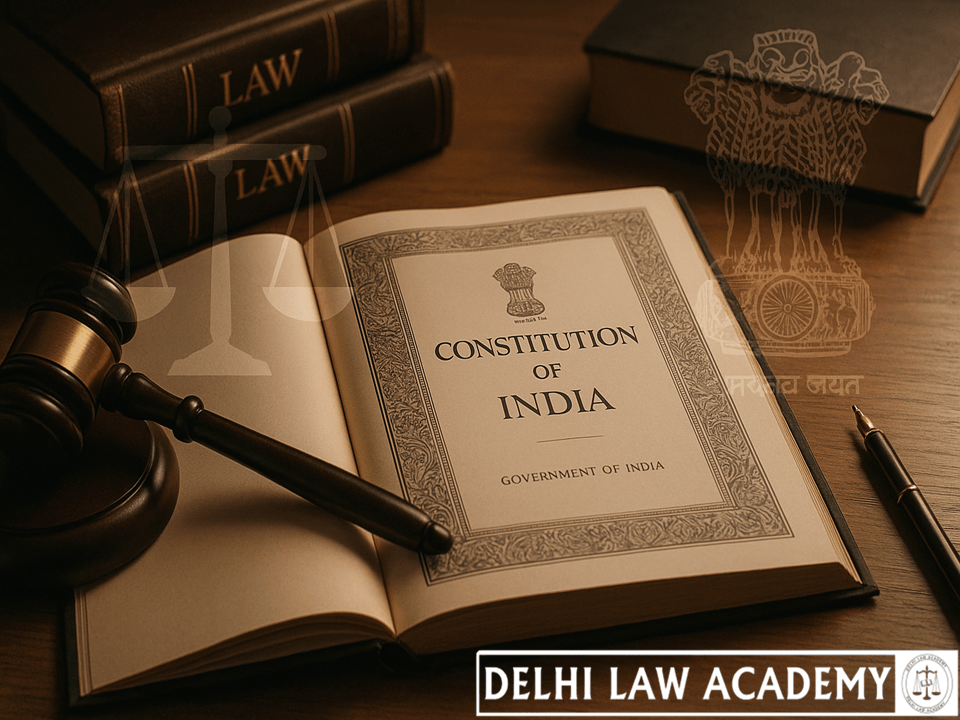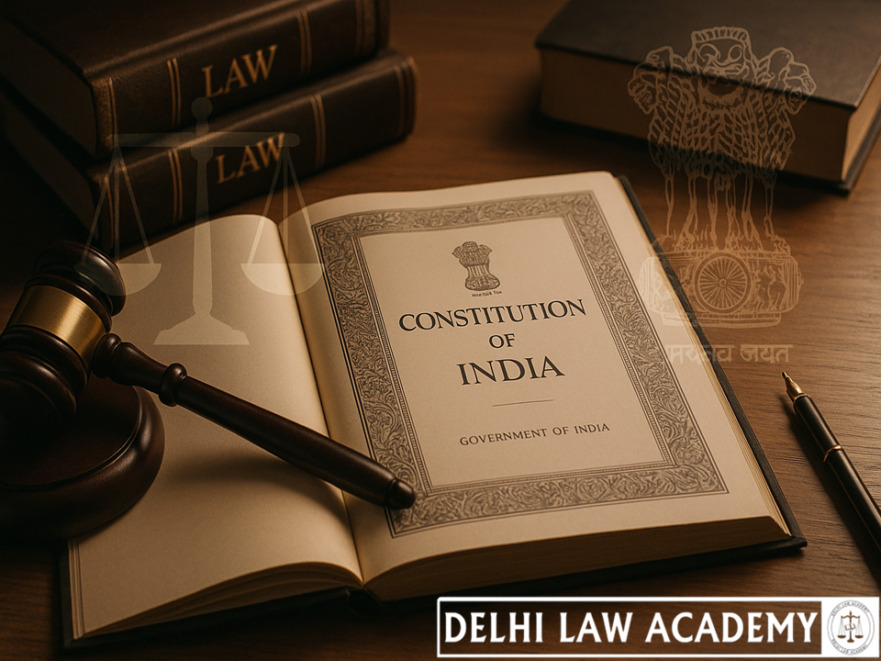
🏛️ Union Council of Ministers (Articles 74–78)
Delhi Law Academy Jaipur | Constitution Notes for RJS, DJS, PCS(J) & Other Judiciary Exams
📘 Topic Overview
Delhi Law Academy Jaipur presents below for aspirants of RJS, DJS, PCS(J) and other Judicial Services throughout India a short Note on the Union Council of Ministers.
****************** Supreme Court Judgments discussed in this post: U. N. R. Rao v. Indira Gandhi [1971 SC] • It is essential to have a Council of Ministers under Article 74(1) even at a time when the House of the People has been dissolved or its term has expired S.P. Anand v. H.D. Deve Gowda [1997 SC] • A person who is not a member of either House of Parliament can be appointed as the Prime Minister of India. ****************** Provisions of the Constitution Article 74 Council of Ministers • Council of Ministers with PM at the head o to aid and advise the President o who shall act in accordance with such advice • President may return the advice for reconsideration o but the subsequent advice is binding • Such advice is not to be inquired into by any court Article 75(1) Other provisions as to Ministers • Prime Minister is to be appointed by President o Other ministers are to be appointed by him on advice of PM Article 75(1A) • Number of ministers o not to exceed 15% of total members of Lok Sabha Article 75(1B) • An MP disqualified under Tenth Schedule o is not to be appointed as Minister Article 75(2) • Ministers to hold office during pleasure of President Article 75(3) • Council of Ministers is collectively responsible to Lok Sabha Article 75(5) • A minister who is not an MP for 6 months o ceases to be a minister ************** DLA’s comments on Articles 74 and 75 Question 1: • Is it essential to have a Council of Ministers under Article 74(1) even at a time when the House of the People has been dissolved or its term has expired? Ans: • U. N. R. Rao v. Indira Gandhi [1971 SC] Facts of the case: • A writ of quo warranto was prayed in this appeal against the continuation of Smt. Indira Gandhi as the Prime Minister since the House of the People had been dissolved. Contention of the petitioner: • Article 75(3) prescribes that “the Council of Ministers shall be collectively responsible to the House of the People”. • How can the Council of Ministers be collectively responsible to the House of the People when it has been dissolved under Article 85(2)? Supreme Court: • Article 75(3) brings into existence what is usually called “Responsible Government”. The Council of Ministers must enjoy the confidence of the House of People. While the House of People is not dissolved under Article 85(2)(a), Article 75(3) has full operation. But when it is dissolved the Council of Ministers cannot naturally enjoy the confidence of the House of People. • On the other hand, Article 74(1) is mandatory and, therefore, the President cannot exercise the executive power without the aid and advice of the Council of Ministers. • We must then harmonise the provisions of Article 75(3) with Article 74(1) and Article 75(2). • In the context, therefore, Article 75(3) only applies when the House of People does not stand dissolved or prorogued. Decision: • Yes, it is essential to have a Council of Ministers under Article 74(1) even at a time when the House of the People has been dissolved or its term has expired. **************** Question 2: • Can a person who is not a member of either House of Parliament be appointed as the Prime Minister of India? Ans: • S.P. Anand v. H.D. Deve Gowda [1997 SC] Supreme Court: • On a plain reading of Article 75(5) it is obvious that the Constitution-makers desired to permit a person who was not a member of either House of Parliament to be appointed a Minister for a period of six consecutive months and if during the said period he was not elected to either House of Parliament, he would cease to be a Minister. Contention of the petitioner: • Even if the Constitution is construed to permit a person who is not a member of either House of Parliament to be appointed a Minister for six months, there is nothing in Article 75(5) to suggest that he can be appointed the Prime Minister of the country. • The status of the Prime Minister is distinct from that of a Minister and, therefore, it is essential that a person who occupies the high position of a Prime Minister should be an elected representative of the people. Supreme Court: • The person who is appointed the Prime Minister is chosen by the elected representatives of the people and can occupy the position only if he enjoys the confidence of the majority of the elected representatives in the Lok Sabha. • The Council of Ministers is made collectively responsible to the House of the People. The form of the oath prescribed in the Third Schedule under Article 75(4) is the same for the Prime Minister as well as a Minister. The Constitution does not draw any distinction between the Prime Minister and any other Minister in this behalf. • The caption of Article 75 as a whole is “Other provisions as to Ministers”. No separate provision is to be found dealing with the appointment of the Prime Minister as such. • Even when a Prime Minister is not a member of either House of Parliament, once he is appointed he becomes answerable to the House and so also his Ministers and the principle of collective responsibility governs the democratic process. • Even if a person is not a member of the House, if he has the support and confidence of the House, he can be chosen to head the Council of Ministers without violating the norms of democracy and the requirement of being accountable to the House would ensure the smooth functioning of the democratic process. Decision: • Yes, a person who is not a member of either House of Parliament can be appointed as the Prime Minister of India. ******************* Article 76 Attorney General Appointment • Attorney General is to be appointed by President Qualifications • He should be qualified to be a judge of SC Duties • To give advice to govt upon legal matters • To perform duties of legal character as assigned by President Rights • Has a right of audience in all courts in India Removal • Holds office during the pleasure of President Remuneration • Remuneration is to be determined by President Article 77 Conduct of govt business • All executive action of Union o is to be taken in the name of President • Orders are to be authenticated o in such manner as specified in rules • President is to make rules o for transaction of business of Govt of India o for allocation of work among ministers Article 78 Duties of Prime Minister • To convey to President all decisions of Council of Ministers on o administrative affairs and o proposals for legislation • To furnish information to President as asked for by him o on administrative affairs and legislative proposals • To submit a Minister’s decision to Council of Ministers o if so asked for by President
📚 For detailed constitutional notes & Judiciary Exam preparation, visit
Delhi Law Academy
📘 Stay Ahead with Delhi Law Academy!
Get access to free monthly current affairs, read our insightful blogs,
and explore free study resources prepared by experts at DLA Jaipur. 🚀
💬 FAQs — Union Council of Ministers (Articles 74–78)
Key Judiciary Exam FAQs on Articles 74–78 — Council of Ministers, Prime Minister, Attorney General & related Supreme Court cases.
This ensures that India functions as a parliamentary democracy where the real executive power rests with the Council of Ministers.
Search term: “Council of Ministers Article 74 explained”
If not elected to either House within that period, he ceases to hold the office.
Search term: “Can a non-MP become Prime Minister of India Article 75(5)”
Article 74(1) is mandatory — the President cannot exercise executive power without their aid and advice.
Search term: “Council of Ministers when Lok Sabha dissolved Article 74 case law”
This means all Ministers stand and fall together — if the Lok Sabha passes a vote of no-confidence, the entire Council, including the Prime Minister, must resign.
Search term: “Collective responsibility Article 75(3) judiciary notes”
He advises the government on legal matters, represents the Union in courts, and has the right of audience in all courts in India.
Search term: “Powers and duties of Attorney General of India Article 76”
- Communicate all decisions of the Council of Ministers to the President
- Provide information as requested by the President
- Submit for reconsideration any Minister’s decision if directed by the President
This ensures the President remains informed of all executive decisions.
Search term: “Duties of Prime Minister Article 78 explained”
📘 For more judiciary exam notes & constitutional case summaries, visit
Delhi Law Academy
Contact us
📍 Delhi Law Academy – Jaipur Branch
6C, Tower 2, Coaching Hub, Pratap Nagar, Jaipur – 302033
📞 Phone:
+91 9911916552
+91 8447285606
✉️ Email:
contactus@delhilawacademy.com

